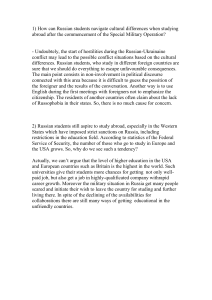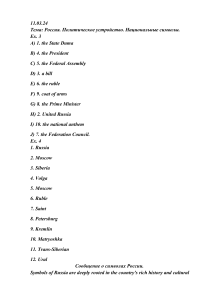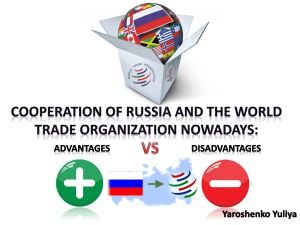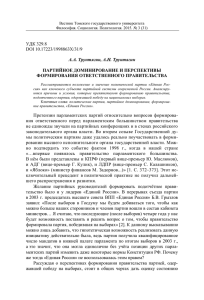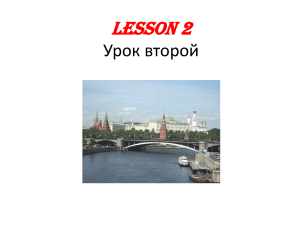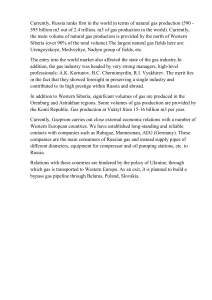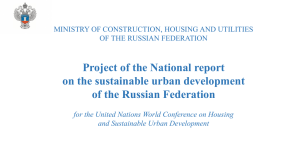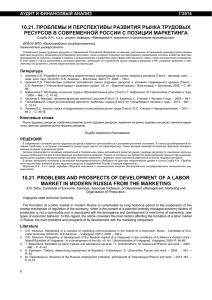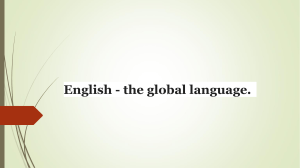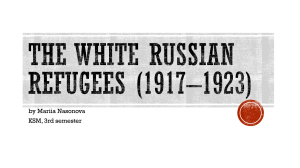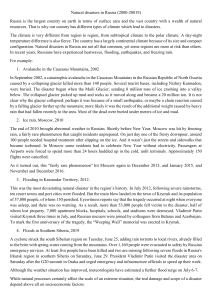American University in Central Asia, Department of General
реклама
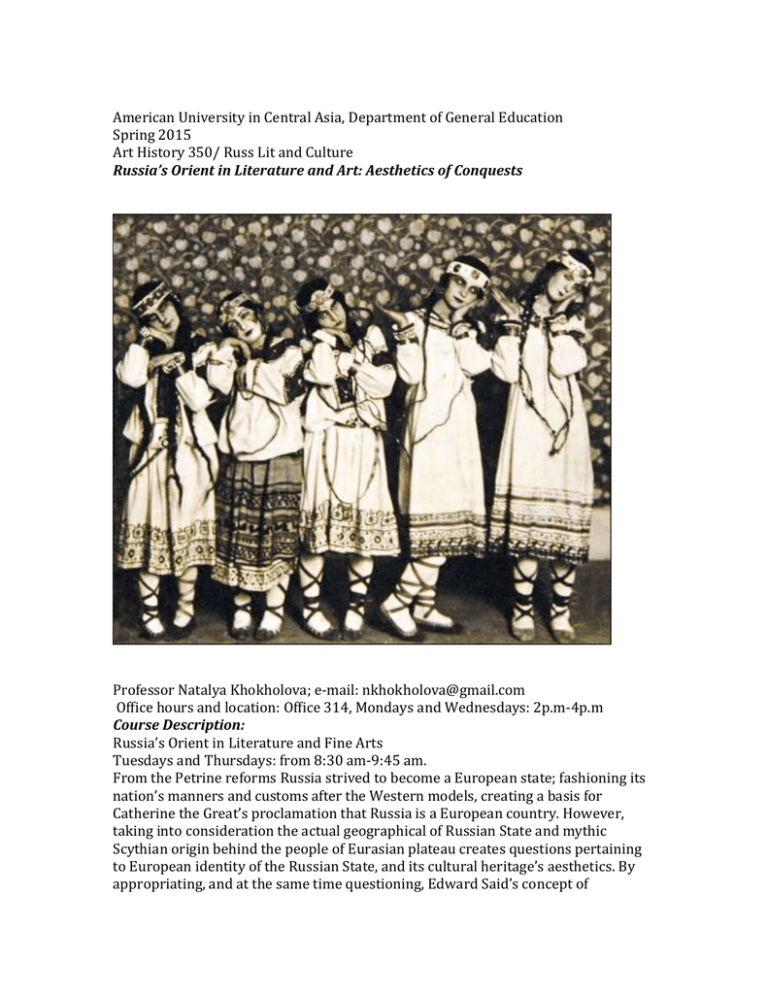
American University in Central Asia, Department of General Education Spring 2015 Art History 350/ Russ Lit and Culture Russia’s Orient in Literature and Art: Aesthetics of Conquests Professor Natalya Khokholova; e-mail: [email protected] Office hours and location: Office 314, Mondays and Wednesdays: 2p.m-4p.m Course Description: Russia’s Orient in Literature and Fine Arts Tuesdays and Thursdays: from 8:30 am-9:45 am. From the Petrine reforms Russia strived to become a European state; fashioning its nation’s manners and customs after the Western models, creating a basis for Catherine the Great’s proclamation that Russia is a European country. However, taking into consideration the actual geographical of Russian State and mythic Scythian origin behind the people of Eurasian plateau creates questions pertaining to European identity of the Russian State, and its cultural heritage’s aesthetics. By appropriating, and at the same time questioning, Edward Said’s concept of “orientalism” we are going to explore visual and imaginative representations of the other European Russia/non-European Russia, and its Empire. Course Objectives: Курс нацелен на развитие исследовательских навыков и выявление проблематики причинно-следственных факторов политикоидеологического (и соответственно соц.-экономического) профиля в эстетике изобразительного (изящного) искусства и художественного текста, в рамках концепции Ориентализма. Работа курса основывается на структурированном анализе отобранных произведений и полотен, в первой части семестра: эпохи Русского Романтизма, во второй: Русского Модернизма (включая событие рождения балета (Ballet Russe) Дягилева). Основным сюжетным фоном текстов является привлекательная и в то же время отталкивающая «спорная» интерпретация Востока Российской Империи. При разборе и активном чтении сборки культурологических эссе и подобранных текстов, студенты ознакомятся с теорией формализма и историческими нюансами эпохи, пробудившими интерес к художественному раскрытию/ сокрытию термина «ориентализм». Course Requirements: The course is in a format of lecture/discussion seminar. When introducing a new concept and or an important event within the range of our study, I’ll be providing lectures accompanied with audio-visual presentations. However, 70% of the seminar consists of discussions, mock debates/ trials, response notes, and minipresentations. The success of this course depends on instructor/student collaboration and exchange of ideas. I am also going to be putting a great emphasis on attendance, make sure that unexcused <2 absences will cost you 40% of your grade. If you wish to be excused for an absence you will need to present some form of written documentation that I can keep for my files. All readings are to be completed before the class for which they were assigned. It is expected for you to be ready to offer questions and observations about what you have read. Written assignments must be completed by the designated due date—work handed in late will be marked down significantly. In class I expect you to uphold appropriate standards of behavior at all times. Among other things this means arriving promptly, turning off your cell phone, staying in your seat until the class is over, refraining from private conversations and being respectful at all times to your colleagues and your professor. Cell Phone/ Computer Policy: No usage of cell phones and or of any other portable e-devices is permitted in this class. Exceptions will be made if necessary. Academic Integrity: All incidents of plagiarism will be reported to Dean’s Office and to the General Education department, and the student will be excused from the class with a failing grade. Grading: Written work for the class will consist of two quizzes, weekly presentations, home assignment response papers, and final exam. Attendance and participation in class discussions will also count toward your final grade. Analytical (response) papers 20% Journal 10% Quizzes 10% Presentations 15% Final Exam 30% Margin of adjustment based on attendance and participation: +/-15% Disabilities Policy: Students at AUCA who have a physical, medical, learning or psychiatric disability, either temporary or permanent can be accommodated in accordance with the needs and regulations of the condition, after providing all the necessary paperwork from your medical doctor/institution to Office#314. Course Biweekly Schedule: I. Золотые Отблески Древних Лет: Начало Мифологий Weeks 1 and 2: Introduction: Eurasian Plateau and Herodotus on the Scythians Opera “Turandot” – a visit to the museum “Scythian Gold” Weeks 3 and 4: The Tale of Igor’s Warfare Edward Said, Orientalism, excerpt from introduction/ II. Варварское похищение Европы: от Петровских Реформ к Великолепию Екатирининской Эпохи Weeks 5 and 6: http://cesran.org/Dosyalar/MAKALELER/MARK_BASSIN_CLASSICAL_EURASIANIS M_AND_THE_GEOPOLITICS_OF_RUSSIAN_IDENTITY.pdf Weeks 7 and 8: Orlando Figes “Natasha’s Dance”— Mapping out an understanding of imperialist expansions in Arts and Fashions: France- Algiers British Empire- India Russian State- Central Asia and Persia III. Мечты о Прекрасном в Опиумных Снах/ Opium –infused Dreams of the Sublime Weeks 9 and 10: Pushkin’s Fairy Tales and their Tatarian Origin Lermontov’s “Bela” IV. Фетиш Востока в Русском Модернизме Weeks 10 and 11: Символисты/ Рерих/ Бакст Weeks 12 and 14: балет Дягилева Watching an excerpt from “Rites of Spring” V. Мифы Прошлого и Современность: Гордость и Предубеждение Weeks 15 and 16: фильм “Кавказский Пленник” или “Я Люблю Тебя” (2004) Additional Readings (Pending): Caught at the Border: Travel, Nomadism, and Russian National Identity in Karamzin's "Letters of a Russian Traveler" and Dostoevsky's "Winter Notes on Summer Impressions" Ingrid Kleespies The Slavic and East European Journal, Vol. 50, No. 2 (Summer, 2006), pp. 231-251 Andreas Schö nle, “Garden of the Empire: Catherine’s Appropriation of the Crimea,” Slavic Review, v. 60, no. 1, pp. 1-24 Week Six: The Conquest of the Caucasus 10/6 – 10/8 Fedor Dostoevsky “Geok-Tepe: What Is Asia to Us?” Diary of a Writer vol. 2, 104352 Seymour Becker, “Russia Between East and West: the Intelligentsia, Russian National Identity and the Asian Borderlands," Central Asian Survey, 10:4 Kappeller, ch. 6 (recommended)
